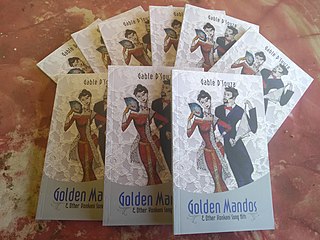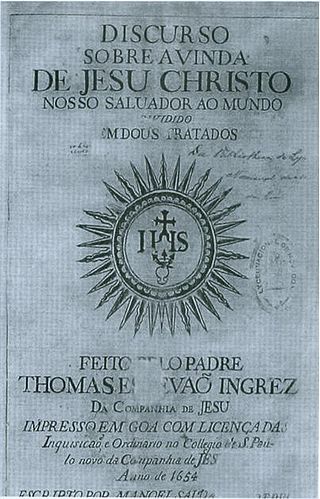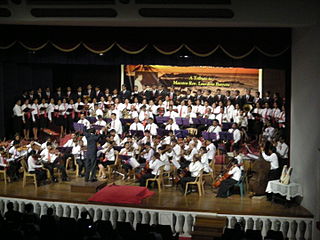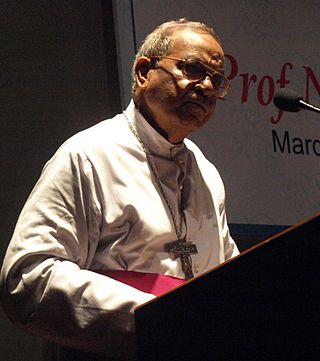Konkani liturgical music refers to the sacred music used in the liturgy in the Konkani language. Konkani is used in liturgy in the Archdiocese of Goa and Daman, and the dioceses of Mangalore, Karwar, Udupi and Sindhudurg.
Contents

Konkani liturgical music refers to the sacred music used in the liturgy in the Konkani language. Konkani is used in liturgy in the Archdiocese of Goa and Daman, and the dioceses of Mangalore, Karwar, Udupi and Sindhudurg.

Prior to Vatican II, most of the liturgy was in Latin. When liturgy in vernacular languages was introduced in Vatican II, Fr. Vasco do Rego SJ led the effort to compose the needed Konkani liturgical music. [1] [2]
Goan composers developed a rich and unique form of motets for the Lenten season, which were accompanied by violins, clarinets and double bass. Goan church authorities had obtained special permission from the Holy See to use these instruments during the Holy Week services. [1] Unfortunately, most of these Konkani motets were not preserved and have been lost.[ citation needed ]
There were similar efforts made independently in Mangalore in the field of Konkani liturgical music.[ citation needed ]

There are organised choirs in most Catholic churches. A notable choir from Goa is the all-male seminarians' Santa Cecilia Choir (Coro di Santa Cecilia), part of the over 400 year old Rachol seminary (Seminário de Rachol) of Goa. The choir has also been known to use a 16th-century restored pipe organ for its concerts.[ citation needed ]

Konkani is an Indo-Aryan language spoken by the Konkani people, primarily in the Konkan region, along the western coast of India. It is one of the 22 scheduled languages mentioned in the Indian Constitution, and the official language of the Indian state of Goa. It is also spoken in Karnataka, Maharashtra, Kerala, Gujarat as well as Damaon, Diu & Silvassa.

Music of Goa refers to music from the state of Goa, on the west coast of India. A wide variety of music genres are used in Goa ranging from Western art music to Indian classical music. Konkani music is also popular across this tiny state. Being a former territory of Portugal, Goa has a dominant western musical scene with the use of instrument such as the violin, drums, guitar, trumpet and piano. It has also produced a number of prominent musicians and singers for the world of Indian music. Portuguese Fado also has significance in Goa.

The Titular Patriarch of the East Indies in the Catholic hierarchy is the title of the Archbishop of Goa and Daman in India; another of his titles is the Primate of the East. Unlike the patriarchs and the major archbishops of the Eastern Catholic Churches sui juris, the Patriarch of the East Indies is within the Latin Church similar to the residential Latin Patriarchs of Venice, Lisbon and Jerusalem, enjoying only an honorary position. Like the Patriarch of the West Indies, the Patriarch of the East Indies is a titular patriarchate unlike the residential Latin Catholic Patriarchs. The title is attached to the Archbishop of Goa and Daman, the diocesan ordinary of the Archdiocese of Goa and Daman and the metropolitan archbishop of the Province of Goa and Daman.
Goan Catholics are an ethno-religious community of Indian Christians adhering to the Latin Rite of the Catholic Church from the Goa state, in the southern part of the Konkan region along the west coast of India. They are Konkani people and speak the Konkani language.

Lourdino Barreto was an Indian musicologist and Catholic priest. He is considered one of Goa's greatest western classical musicians.

The Roman Catholic Metropolitan Archdiocese of Goa and Daman encompasses the Goa state and the Damaon territory in the Konkan region, by the west coast of India. The ecclesiastical province of Goa and Damaon includes a suffragan diocese, the Sindhudurg Diocese that comprises the Malvani areas of. The Archbishop of Goa also holds the titles of Primate of the East and Patriarch of the East Indies, also hold the title of the Syrian Catholic Primate of the Archdiocese of Cranganore. The beginnings lie in the Padroado system of Portuguese Goa and Damaon, in the early 1900s the primatial see was transferred back to the Sacred Congregation for the Evangelisation of Peoples, as the Padroado system of the Indo-Portuguese era was being dismantled.
Goan Catholic literature is diverse.

Krista Purana is an epic poem on the life of Jesus Christ written in a mix of Marathi and Konkani by Thomas Stephens (1549–1619). Adopting the literary form of the Hindu puranas, it retells the entire story of mankind from the creation days to the time of Jesus, in lyrical verse form. The Christian Puranas – 11,000 stanzas of 4 verses – were very popular in the churches of the area where they were sung on special occasions up to the 1930s. Although no copy of the original edition has yet been discovered, it is believed to have been first published at the College of Rachol in 1616, then re-published posthumously in 1649 and 1654.

Agnelo Gustavo Adolfo de Souza S.F.X., was a Goan Roman Catholic priest of the Society of the Missionaries of St. Francis Xavier, Pilar who performed missionary work in the province of Goa, then part of Portuguese India. The cause for his canonization has been accepted for investigation by the Holy See, and has progressed to the point that he has been declared Venerable.

The Rachol Seminary, also known as Patriarchal Seminary of Rachol, is the diocesan major seminary of the Primatial Catholic Archdiocese of Goa and Daman in Rachol, Goa, India.
Moreno de Souza was a Goan Jesuit priest and Konkani Marian poet, Konkani writer, translator and a historian. He was one of the translators of the Povitr Pustok in Romi Konkani.

Domenico Bartolucci was an Italian cardinal of the Catholic Church. He was the former director of the Sistine Chapel Choir and the Accademia Nazionale di Santa Cecilia, and was recognized in the field of music both as a director and a prolific composer. Considered among the most authoritative interpreters of Giovanni Pierluigi da Palestrina, Bartolucci led the Sistine Chapel Choir in performances worldwide, and also directed numerous concerts with the Choir of the Academy of Santa Cecilia, including a tour of the former Soviet Union.

Konkani in the Roman script, commonly known as Roman Konkani or Romi Konknni refers to the writing of the Konkani language in the Roman script. While Konkani is written in five different scripts altogether, Roman Konkani is widely used. Roman Konkani is known to be the oldest preserved and protected literary tradition beginning from the 16th century AD.

The Santa Cecilia Choir is a polyphonic male choir composed of seminarians of the Rachol Seminary of the Catholic Archdiocese of Goa and Daman in Goa, India.
The history of Bible translations into the Konkani language begins with Ignazio Arcamone (1615–1683), an Italian Jesuit working in Salcette, Goa was the first to translate parts of the Bible to Konkani language. It was published under the title "Sogllea Vorunsache Vanjel" from Rachol Seminary Printing Press in 1667. Copies of this book are not available.

Goa is a state on the southwestern coast of India within the Konkan region, geographically separated from the Deccan highlands by the Western Ghats. It is bound by the Indian states of Maharashtra to the north, and Karnataka to the east and south, with the Arabian Sea in the west. It is India's smallest state by area and fourth-smallest by population. Goa has the highest GDP per capita among all Indian states, two and a half times as high as the GDP per capita of the country as a whole. The Eleventh Finance Commission of India named Goa the best-placed state because of its infrastructure, and India's National Commission on Population rated it as having the best quality of life in India. It is the second-highest ranking among Indian states in the human development index.

Raul Nicolau Gonçalves was an Indian prelate. He was the first Goan catholic to be Archbishop of Goa and Patriarch of the East Indies.

Aniceto Nazareth was a Roman Catholic priest of the Archdiocese of Bombay, musician, published composer and liturgist.
Vasco do Rego was an Indian Jesuit priest who played a significant role in the promotion of Konkani language, literature and music, particularly after the Annexation of Goa. He was the editor of the religious monthly Dor Mhoineachi Rotti for many years.
Gaionancho Jhelo is the official hymnal of the Archdiocese of Goa and Daman. It was first published a few years after liturgy in vernacular languages was introduced in the Second Vatican Council. The latest edition was brought out in 1993.